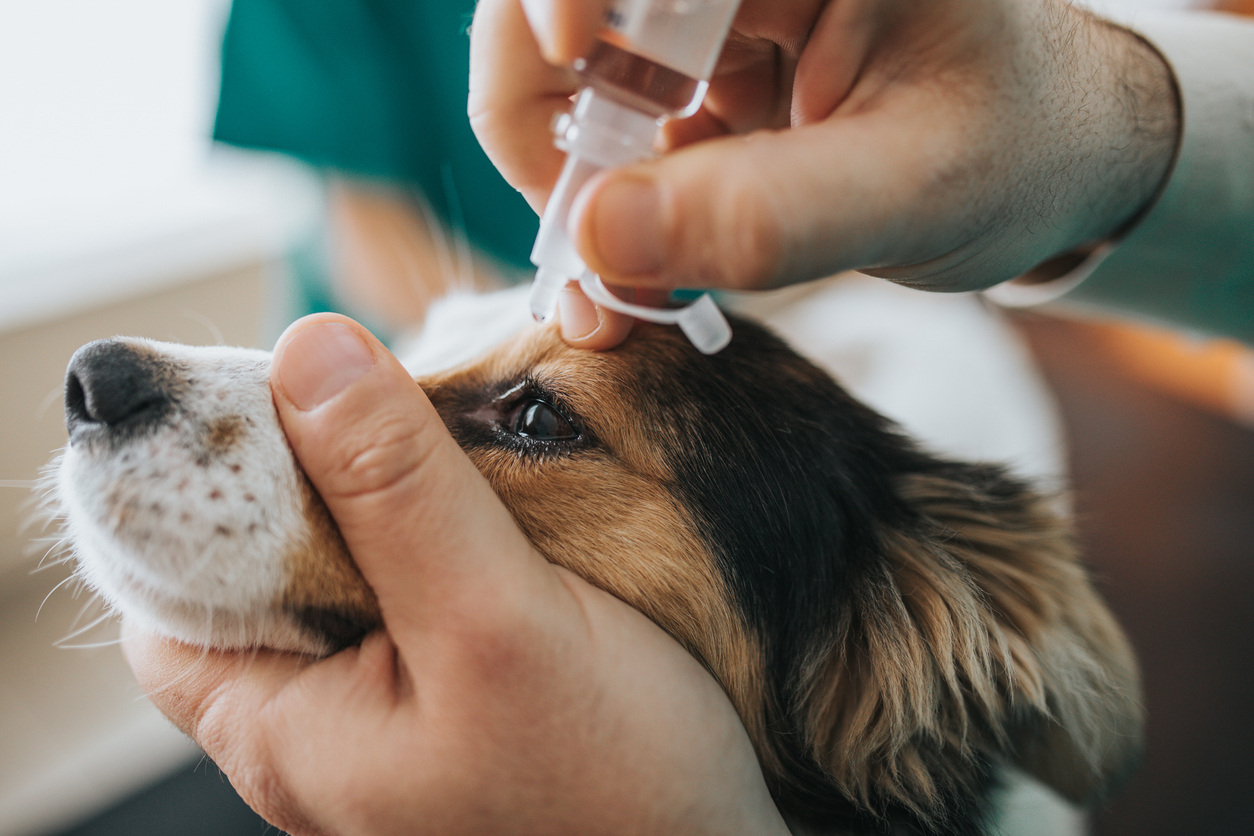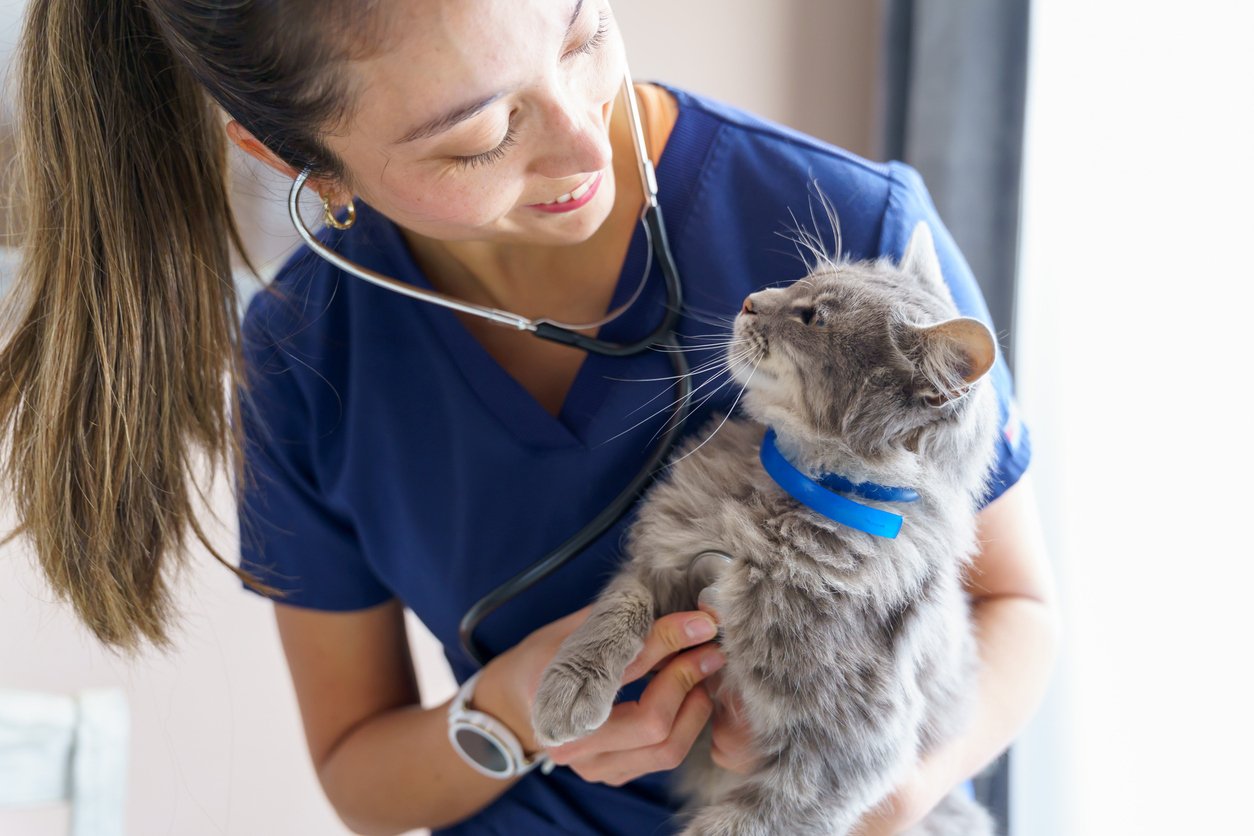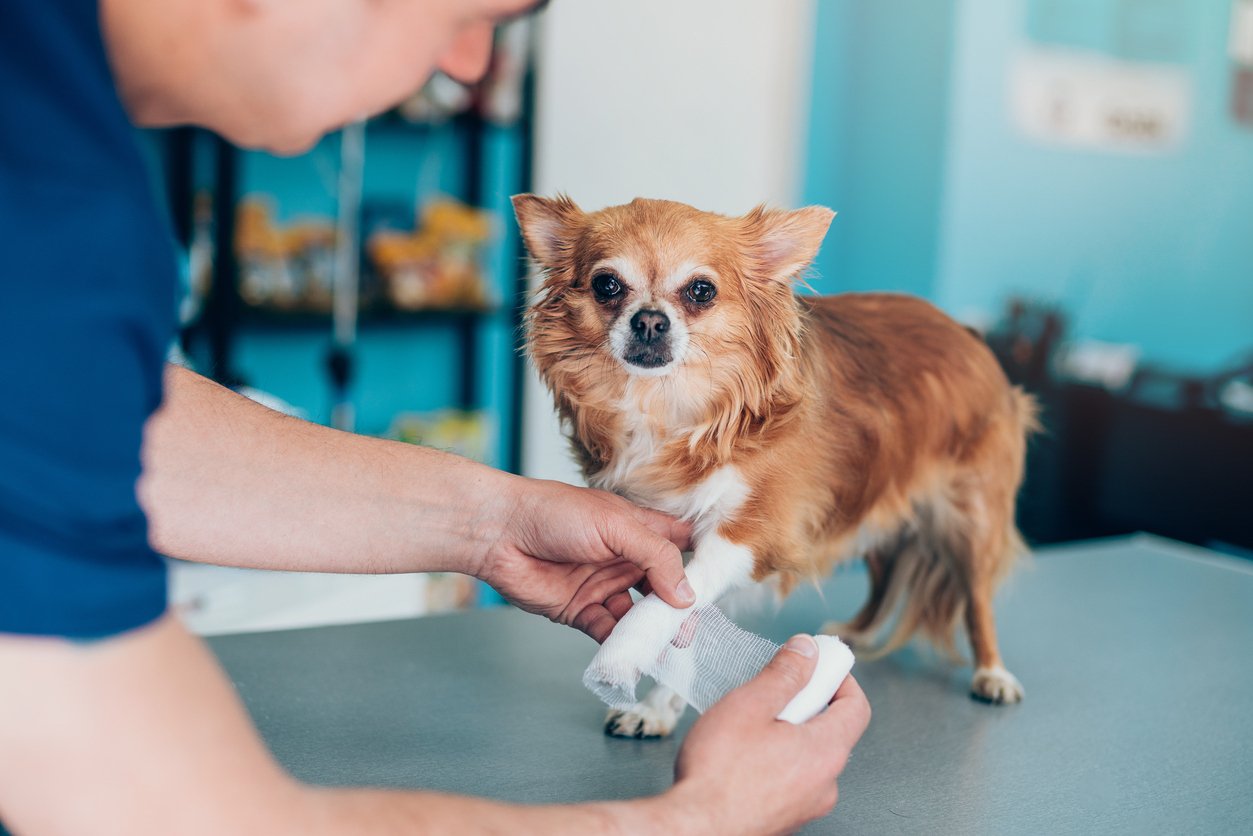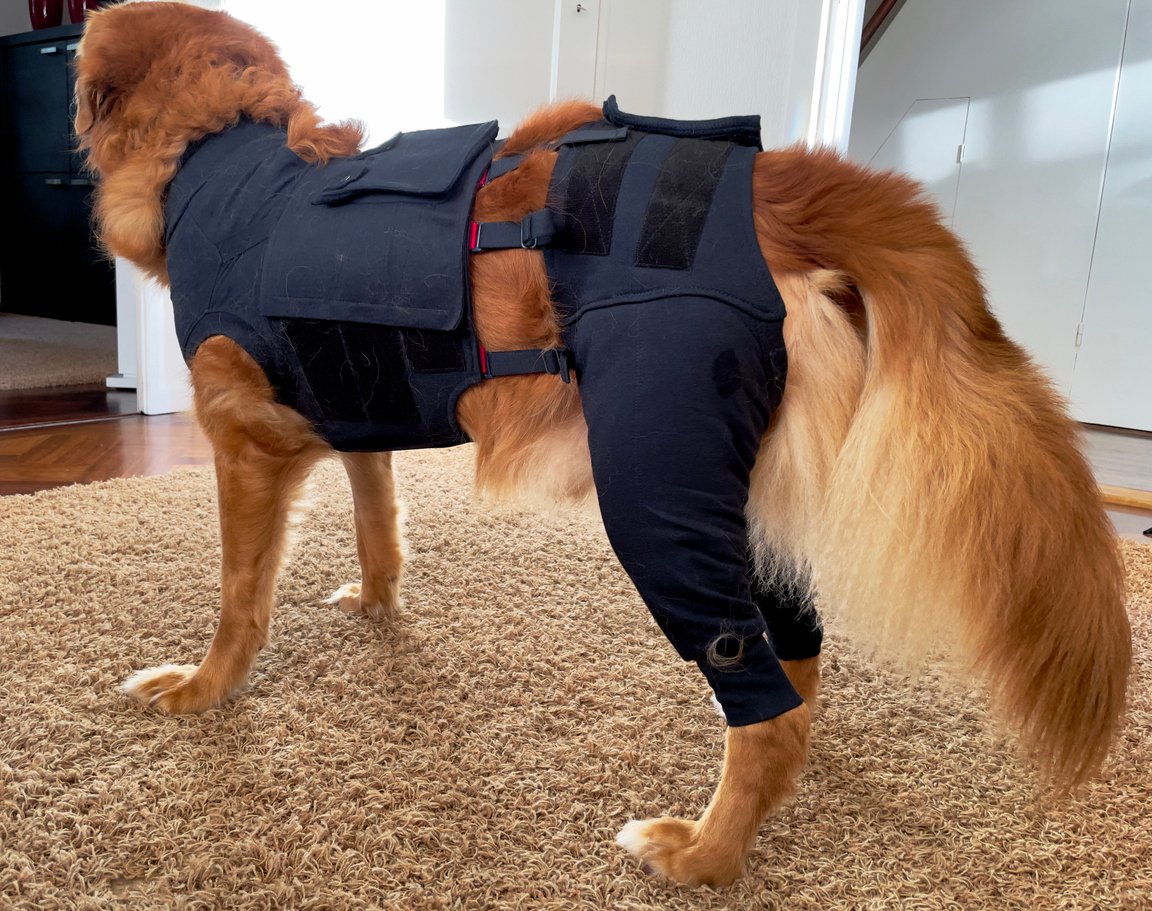Table of Contents
Dogs have been by our side for over 30,000 years, showing our unending love and dedication to their well-being.
But like humans, dogs can be victims of diseases prevalent among other animals. Eye problems in dogs are among the most common diseases found in our furry friends.
Eye issues may be uncomfortable for your dog and, if not treated in time, can lead to more serious dog health issues.
In this guide, we'll learn about the causes, symptoms, treatment, and other related aspects of common eye problems in dogs so that you may be better equipped to care for your canine friend and ensure his or her eyes remain bright and healthy.
Causes of Eye Problems in Dogs
Like us, dogs have their own share of eye problems, and infections are among the most rampant.
When learning how to take care of a dog, one must become familiar with the causes of such infections so that they are easily preventable and curable.
As a dog owner, it’s important to understand that dogs' eye infections can be caused by a variety of factors, including:
- Bacteria
- Virus
- Fungi
- Environmental irritants
- Health complications
Understanding these causes in the first place allows you to prevent them from affecting the animal and, if need be, understand when to consult a veterinarian.
This table highlights the various causes of eye infections in dogs for easy reference.
|
Reasons for Eye Problems in Dogs |
Description |
|
Dog Eye Bacterial infection |
These are most commonly caused by ubiquitous bacteria in the animals' environment or through infected animals. |
|
Viral Infections |
May accompany or be the result of canine distemper, herpesvirus, or other viral agents. |
|
Fungal Infections |
Less common but still possible, especially in certain climates or conditions |
|
Environmental Irritants |
Dust, pollen, smoke, and other irritants can cause eye infections. |
|
Allergies |
Allergic reactions can cause irritation, potentially resulting in an eye infection. |
|
Mechanism of Injury |
Scratches or foreign bodies in the eye can be an entry for an infection. |
|
Co-existing Medical Conditions |
Individuals with all forms of dry eye conditions or autoimmune diseases may potentially increase susceptibility to infections. |
Cataracts, glaucoma, and vision problems related to aging are common in older dogs, hence the need to watch out for them and ensure appropriate treatment. These can be detected with regular veterinary check-ups, as an intervention may be required to retain your dog's eyesight.
Take care of your dogs' eyes by cleaning them, protecting them from hazards, and seeking veterinary care promptly.
With knowledge of the most common causes of eye problems in dogs and proactive care, you can help ensure clear and healthy eyes throughout your canine companion's life.
Dog Eye Infection Symptoms
If you suspect your dog has an eye infection or wonder, "Does my dog have an eye infection?" Keep reading.
Dogs can become susceptible to many eye diseases, the most common of which are allergies and infections. Accurate symptom diagnosis is essential for administering proper treatment.
Some common symptoms of dog eye infection include:
- Redness and inflammation
- Discharge (clear, green, or yellow)
- Swelling in the region of the eyes
- Squinting or blinking too frequently
- Clawing at the eyes
- Light sensitivity
With these symptoms in mind, you can decide the next course of action. You also want to ensure you understand the difference between a dog eye infection and an allergy.
The table below explains more.
|
Symptom |
Dog Eye Infection |
Dog Eye Allergy |
|
Redness |
Common |
Common |
|
Discharge |
Thick, green, or yellow |
Clear and watery |
|
Swelling |
Often present |
Rarely present |
|
Itching |
Rarely |
Common |
|
Squinting |
Frequent |
Occasionally |
|
Both eyes affected |
Usually one |
Typically both |
|
Other signs |
Lethargy and fever (usually if the infection is systemic) |
Sneezing, coughing, and other allergy-related symptoms. |
Knowing such differences can help you identify whether your pet suffers from an infection or an allergy. As such, you can proceed appropriately by seeing a vet or administering home-based treatment.
Treatment Options for Infection in Dog Eye

Dog eye infections can be painful for the animal and distressing to their owners. They generally exhibit signs of redness, discharge, and irritation, so it is important to understand the symptoms of eye infections in dogs and seek proper treatment to reduce the pain they cause.
If you suspect an eye infection in a dog, it is vital to monitor the symptoms carefully. Redness, watering, squinting, pawing at the eyes, and evident discharge are common symptoms of infection. Immediate action is critical to prevent the infection from worsening and potentially jeopardizing your dog's vision.
Here is an overview of the treatments and causes of eye problems in dogs to assist you in keeping your pet healthy and effectively treating your dog's eye infection:
- Eye drops and ointments: Veterinarians often prescribe oral or topical antibiotics to treat bacterial infections, reduce discomfort, and stimulate healing.
- Oral medications: In cases of severe infection, oral antibiotics may be prescribed for more aggressive treatment.
- Surgery: In cases of chronic or severe infection that does not respond to medication, surgical treatment may be necessary.
- Cleaning and care: Regular cleaning around the affected area can help avoid irritation and infection. A veterinarian may prescribe saline solutions.
- Preventive measures: In addition to the above treatments, proper hygiene, allergen avoidance, and the completion of routine veterinary check-ups can help prevent eye infections from developing.
Regular check-ups with a veterinarian and observing your dog's overall health can significantly reduce the risk of eye problems in dogs. Chronic or severe symptoms must be brought to your veterinarian's attention as soon as possible.
Eye infections in dogs can range in severity, but immediate treatment is necessary for your pet to be comfortable. By staying informed and paying attention, you can be equipped to heal your pup as well as avoid future infections.
Dog Eye Infection Recommended Products
A dog eye infection can be traumatic. Therefore, it is important to identify and treat it in time. Several treatment options are available which can adequately treat and manage the infection.
The following are the best recommendations for the treatment of a dog eye infection:
- Terramycin is an antibiotic ointment used to manage infections involving susceptible organisms. It is also very effective against bacterial infections.
- Vetericyn Plus Antimicrobial Eye Gel: Its soothing and protective characteristics decrease irritation and aid in maintaining healing.
- BNP Triple Antibiotic Ophthalmic Ointment: This helps treat conjunctivitis and many other bacterial infections; it fights a massive variety of bacterial eye infections.
- Nutri-Vet Eye Rinse Liquid for Dogs: It is scientifically proven to wash and soothe eyes, reducing irritation and minimizing the chance of eye infections.
- Curicyn Original Formula: This broad-spectrum formula can clean and treat all sorts of wounds and even eye diseases.
Regular visits to the vet and proper hygiene ensure that your dog's eyes will shine with health. Always consult your vet whenever your dog needs to start a new treatment.
How to Prevent Eye Problems in Dogs
It's best to follow the basics when preventing an eye infection in your furry friend. Dogs have healthy eyes via proper care and hygiene.
These steps will help you avert the occurrence of disease in your dog's eye:
- Regular cleaning: Gently clean the eyes with a moist cloth to remove discharge or dirt. Use a different piece of cloth for each eye to avoid cross-contamination.
- Keep an eye out for potential irritants: Look around your dog for sources of irritation such as dust, dirt, or chemicals. Do not let your dog be in a situation where these might prove a threat.
- Proper grooming: Keep the hair around your dog's eyes clean and well-groomed. Long hair can irritate the eyes while trapping dirt and debris.
- Avoid allergen intake: Always remain cautious with allergens that can cause itching in a dog's eyes, such as pollens, molds, and some food. Find ways to protect your pup if they have allergies.
- Regular visits to the vet: Regular visits help identify early signs of dog eye infection and will prevent rapidly progressive canine infections.
- Protective equipment: Goggle-type protection could be necessary for dogs with a history of eye problems or who spend a lot of time outdoors.
- Balanced diet: Ensure your dog maintains a balanced diet to support overall health, including eye health. Avoid feeding them a bland diet and incorporate a variety of nutrients such as proteins, healthy fats, vitamins, and minerals.
These preventative measures will keep your dog's eyes healthy and infection-free. Attention and care toward your dog's eyes can greatly ensure that problems are stopped right in their tracks. Contact your veterinarian if you see any pain symptoms or an eye infection starting to brew.
Common Questions Regarding Eye Problems in Dogs

Dog eye infections can worry many pet owners. It is essential to understand what causes these infections, how to treat them, and their impact on your dog's overall health.
Here, we address some common questions about eye problems in dogs to help you care for your furry friend better.
Can You Get an Eye Infection from a Dog?
One concern among dog owners is whether they can catch an eye infection from their dog. While some diseases can be transmitted between animals and humans, the chance of getting an eye infection from your dog is quite low.
Dog eye infections are usually caused by bacteria, viruses, or fungi. Common bacterial infections involve Staphylococcus and Streptococcus species. Viruses might include canine distemper or adenovirus, while fungal infections are less frequent but possible.
There are a few situations where a dog's eye infection could pose a risk to humans:
- Direct contact: If you touch the discharge from an infected eye and then touch your own eye, there is a small risk of getting an infection, especially if it is bacterial.
- Weakened immune system: People with weaker immune systems might be more susceptible to infections from pets.
To reduce the risk of transmission:
- Good hygiene: Always wash your hands thoroughly after handling your dog, especially if they have an eye infection.
- Avoid touching your face: Try not to touch your face or eyes after petting your dog.
- Seek veterinary care: Get prompt treatment for your dog's eye infection to reduce the spread of bacteria or viruses.
Following these guidelines can mitigate the risk of a potential eye infection and help keep you and your pup safe.
Can an Eye Infection Make a Dog Sick?
An eye infection in dogs isn't just a minor irritation; it can lead to significant discomfort and broader health issues.
Understanding these symptoms and their potential impact on your dog's overall well-being can help you take the necessary steps to ensure a swift recovery:
- Pain and Irritation: Dogs with eye infections often experience significant discomfort, which can show as pawing at the eye, blinking more, or being sensitive to light.
- Discharge: Infections typically cause discharge that can be clear, green, or yellow, indicating pus.
- Swelling and Redness: The infected eye may appear swollen and red, and the surrounding tissues can also become inflamed.
Systemic Effects:
In severe cases, an eye infection can lead to broader health issues:
- Fever: If the infection spreads, it can cause a fever, indicating that the dog’s body is fighting it.
- Loss of Appetite: Pain and discomfort can lead to a decreased interest in food and water, resulting in weight loss and dehydration.
- Lethargy: The general malaise associated with an infection can make a dog less active and more lethargic than usual.
An eye infection can sometimes indicate an underlying health issue:
- Immune System Disorders: Conditions that weaken the immune system can make dogs more susceptible to infections.
- Chronic Conditions: Diseases such as diabetes or Cushing’s disease can make dogs prone to recurrent infections, including those affecting the eyes.
Timely detection, proper treatment, and regular veterinary care are essential in managing and preventing these infections, ensuring your dog remains healthy and comfortable.
Can a Dog Eye Infection Cause Loss of Vision?
Neglecting dog eye infections may result in grave repercussions, including impaired sight or complete vision loss. The extent of visual impairment is contingent upon the nature and severity of the infection and the timeliness of medical intervention.
Regular consultation with veterinary professionals and swift response to any manifestations of ophthalmic discomfort is key to preventing such complications and preserving your pet's eye health.
Let's look at a few complications that could arise from a dog eye infection.
Corneal Ulcers
One common complication of dog eye infections is the development of corneal ulcers. The cornea is the transparent outer layer of the eye, and infections can cause painful ulcers to form on its surface.
Corneal ulcers vary in severity, like these two examples:
- Superficial ulcers might heal with minimal treatment
- Deeper ulcers can penetrate the corneal layers, leading to significant scarring
Scar tissue can obstruct light from entering the eye correctly, impairing your pet's vision. In severe cases, deep corneal ulcers might even perforate the eye, causing severe pain and potentially leading to permanent vision loss or necessitating surgical intervention.
Glaucoma
Another serious complication is glaucoma, which can result from untreated or severe eye infections. Glaucoma occurs when the pressure inside the eye, known as intraocular pressure, increases to dangerous levels. This heightened pressure can damage the optic nerve, which is fundamental for transmitting visual information from the eye to the brain.
If glaucoma is not managed promptly, the damage to the optic nerve can be irreversible, leading to permanent vision loss.
Dogs with glaucoma might exhibit symptoms such as:
- A cloudy or bulging eye
- Excessive tearing
- Apparent discomfort
Managing glaucoma typically involves medications to reduce intraocular pressure and, in some cases, surgical procedures to alleviate the pressure.
Uveitis
Uveitis, or inflammation of the uvea (the eye's middle layer), can also result from eye infections. The uvea includes the iris, ciliary body, and choroid; its inflammation can be very painful for dogs.
Symptoms of uveitis include redness, pain, photophobia (sensitivity to light), and excessive tearing.
If uveitis is not treated promptly, it can lead to severe complications such as cataracts, glaucoma, or retinal detachment, all of which can result in vision loss. The treatment for uveitis generally involves addressing the underlying infection with appropriate medications and managing the inflammation with anti-inflammatory drugs.
Additional Solutions for Senior Dogs: TRI-ACTA Mobility Supplements

As our beloved pets age, they may encounter various challenges, including mobility and joint health issues.
Old dogs, in particular, may experience discomfort, stiffness, and decreased mobility due to age-related conditions such as osteoarthritis or hip dysplasia. Fortunately, solutions are available to help alleviate these symptoms and improve our furry companions' overall quality of life.
One such solution is TRI-ACTA H.A. for pets, a specially formulated joint treatment option designed to address age-related joint issues and promote healing and mobility in pets.
Ensuring the comfort and well-being of our pets forms the foundation for a long and happy life. TRI-ACTA H.A aids in keeping your dog's joint health in tip-top condition, combining the advantages of glucosamine for dogs, chondroitin sulfate, MSM, and hyaluronic acid, all active ingredients.
The following table provides a detailed breakdown of the benefits of the key active ingredients in our TRI-ACTA formula.
|
Ingredient |
Benefits |
|
Glucosamine (Sulfate and Hydrochloride) |
|
|
Chondroitin Sulfate |
|
|
MSM (Methylsulfonylmethane) |
|
|
Hyaluronic Acid |
|
By leveraging natural ingredients and scientific innovation, TRI-ACTA H.A. provides:
- Complete joint support
- Aid in healing damaged joints
- Reduction of joint inflammation
- Improving mobility for pets with age-related joint issues or recovering from surgery
As a responsible pet owner, you must prioritize your pets' well-being and provide them with the care and support they need as they age. Integericare's TRI-ACTA H.A. is a trusted supplement, offering effective relief and long-term joint support for our beloved companions. When you incorporate TRI-ACTA H.A. into your pet's daily routine, you can contribute to their overall health and happiness, enabling them to thrive well into their golden years.
Ultimately, Integricare's TRI-ACTA H.A. represents more than just a joint supplement—it's a testament to our commitment to your pets' health and vitality. Invest in their joint health with TRI-ACTA H.A. and ensure your furry companions lead fulfilling, active lives for years.
TRI-ACTA H.A. for Pets
Our maximum strength formula is optimally designed to accelerate the formation of cartilage, minimize inflammation, expedite the healing process, and improve joint conditions.
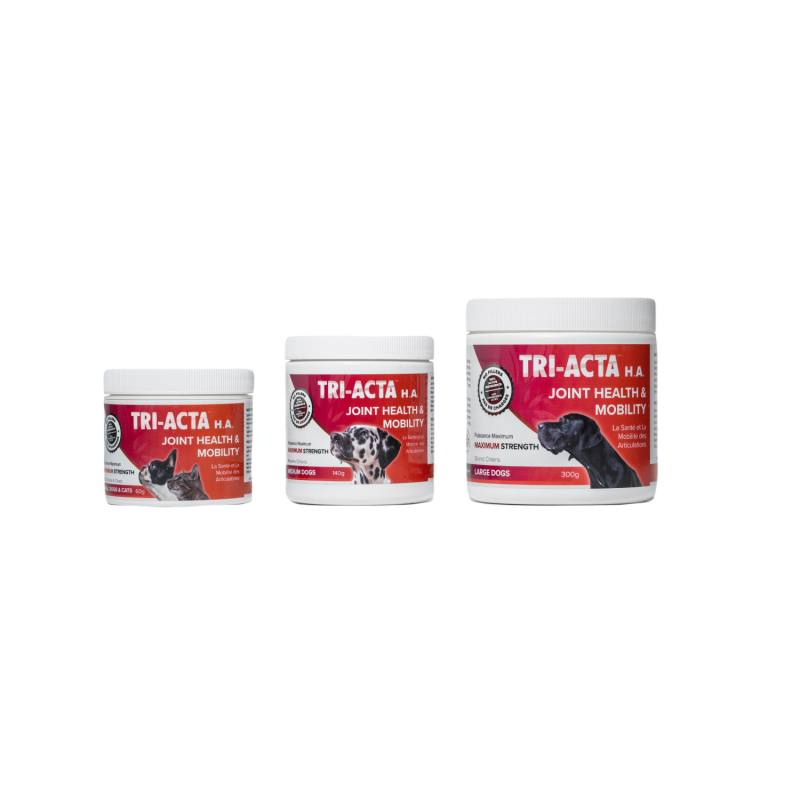
Together, we can support our pets through every stage of life, providing them with the care and comfort they deserve as cherished companions of our loved ones.
Dog Eye Infections—Final Thoughts

Understanding and addressing dog eye infections is essential for the health and well-being of our beloved canine companions. This article has taught us the various causes, symptoms, and treatment options for these infections. From bacterial and viral infections to allergies and foreign objects, the spectrum of potential culprits underscores the importance of vigilance and proactive care.
We've emphasized the significance of prompt veterinary attention, as early diagnosis and treatment can prevent complications and promote faster recovery. Responsible owners must be attuned to any signs of discomfort or abnormal behavior in their dogs, as prompt action can make all the difference in safeguarding their ocular health.
Additionally, you've learned preventive measures such as regular grooming, maintaining a clean environment, and providing a balanced diet rich in essential nutrients (not only to improve eye health but also to maintain dog gut health). These practices contribute to overall health and help fortify the immune system, reducing the risk of infections.
Pet owners must partner with trusted experts and reliable supplement suppliers to provide the best possible care for their furry companions. Integricare is a premium supplement provider and pet expert, offering products to support canine health and wellness. With our commitment to quality and efficacy, pet owners can have confidence in Integricare's pet supplements to enhance their dog's vitality and resilience.
Purchase TRI-ACTA online or learn where to buy at a store near you.
TRI-ACTA for Pets
A proactive approach for developing and younger adult pets to maintain optimal joint health mobility, minimize inflammation and fend off age-related ailments.
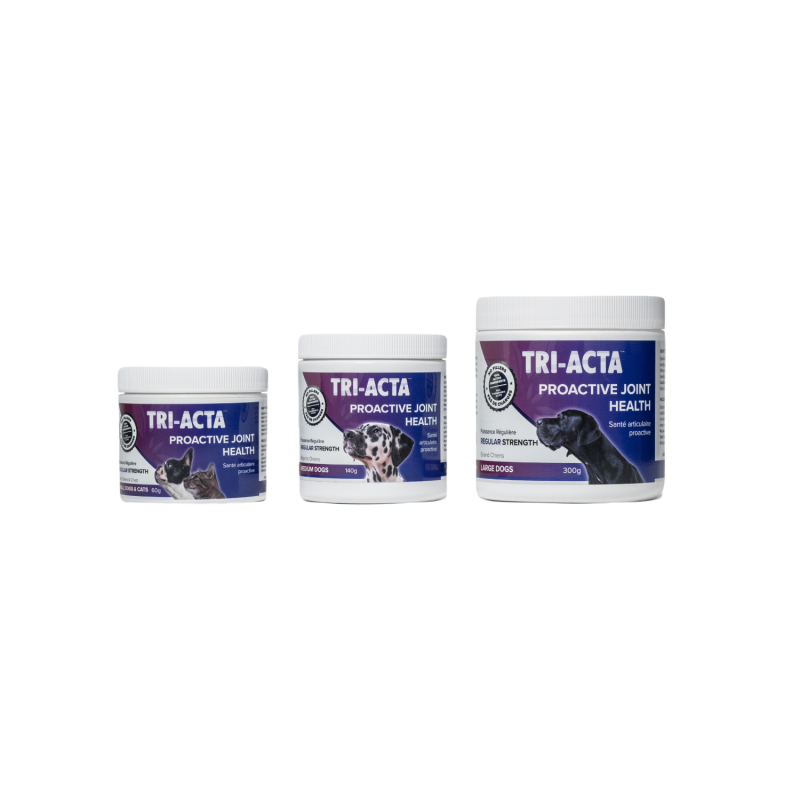
Newsletter Signup
Subscribe to our newsletter to receive the latest news and exclusive offers.
.jpg?height=2000&name=Cliick_Integricare-DISPLAY-REVISEDV2%20(1).jpg)
Proactive & Therapeutic Joint Supplements
When given daily, Integricare joint supplements recover bone and joint injuries faster and help prevent mobility injuries from happening in the first place.

